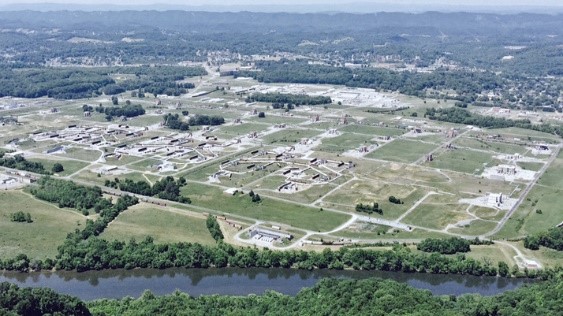
EPA Region 4 and Tennessee regulators issued a permit today allowing the U.S. Army to continue open burning toxic PFAS chemicals at the 6,000-acre Holston Army Ammunition Plant. The burning, which has been going on for decades, produces toxic smoke that often envelops neighboring homes in the city of Kingsport.
Effective today, a permit issued by the State of Tennessee and U.S. EPA Region 4 will allow the U.S. Army to continue open air burning of toxic PFAS chemicals at the Holston Army Ammunition Plant, despite objections from hundreds of citizens and more than 70 organizations.
The renewed Clean Air Act permit will allow the Army to annually open burn as much as 1,250,000 pounds of munitions wastes that may contain as much as 15% PFAS by weight. PFAS polymers are added to improve the performance and stability of military explosives produced at the 6,000-acre base bound by the Holston River, a source for public drinking water.
When heated, PFAS produce poisonous hydrogen fluoride gas. According to federal health officials, hydrogen fluoride gas, even at low levels, can irritate the eyes, nose, and respiratory tract. Breathing in hydrogen fluoride at high levels or in combination with skin contact can cause death from an irregular heartbeat or from fluid buildup in the lungs.
Despite the known health risks, regulators said their authority to regulate PFAS is limited.
“Our ability to address PFAS is also limited by the lack of available information on the amount of PFAS used by the facility,” Tennessee officials said in their response to public comments. “The Division’s authority to regulate PFAS-related emissions is limited because PFAS compounds are not criteria pollutants or hazardous air pollutants and are not listed pollutants under Section 111 of the Clean Air Act.”
However, listed hazardous air pollutants like vinyl chloride are not regulated in the new permit either. Tennessee officials said that the open burning of vinyl chloride was not addressed because it was not in a section of the permit that was open for public comment. However, as neither PFAS nor vinyl chloride appeared anywhere in the 182-page draft permit, such comment was impossible.
Citizens for Safe Water Around Badger (WI) and Volunteers for Environmental Health and Justice (TN) are already in discussions with EPA Headquarters and Congressional representatives about the significant negative precedent that this decision represents for base workers, service members, veterans and host communities. PFAS are not destroyed in an open fire and so are widely dispersed to the air and the surrounding environment where they accumulate in people, as well as fish, wildlife and food crops.
Nearly 300 people – including representatives of 72 civic, environmental, veterans and health organizations from around the nation – submitted public comments objecting to the open air burning of PFAS and other toxic chemicals at Holston Army Ammunition Plant. The burning, which has been going on for decades, produces toxic smoke that often envelops neighboring homes in the city of Kingsport.
The Holston Army Ammunition Plant has been identified by the Department of Defense as a known or suspected source of PFAS contamination.
MEDIA INQUIRIES, contact:
Laura Olah, Executive Director, Citizens for Safe Water Around Badger (WI) 608.643.3124
Mark Toohey, Volunteers for Environmental Health and Justice (TN), 423.765.3947
